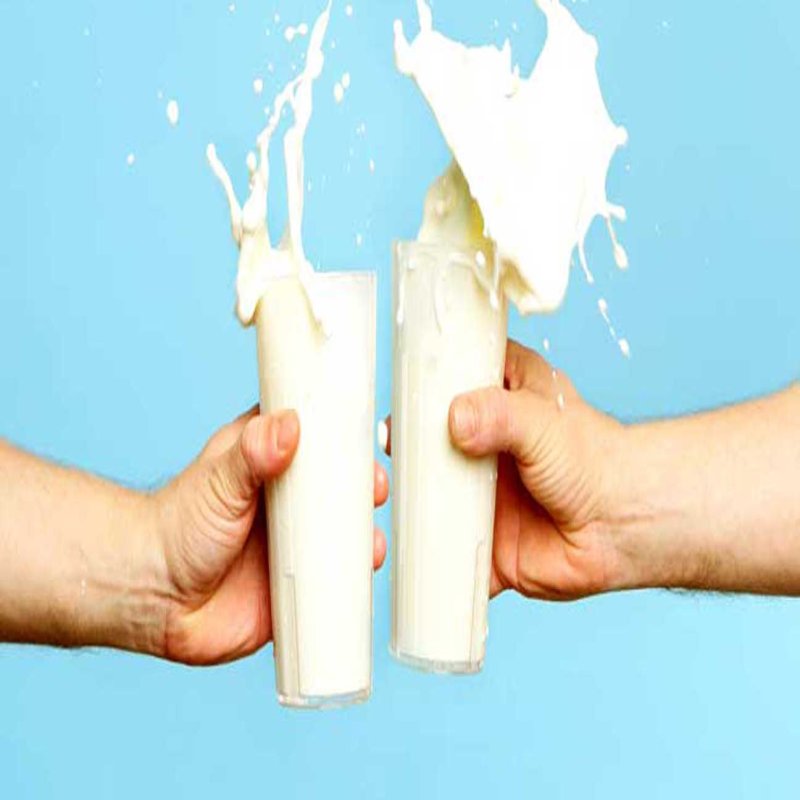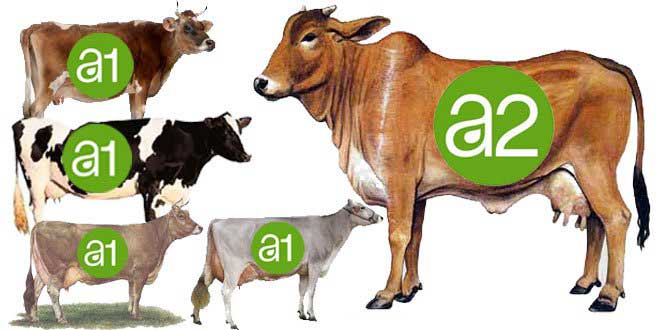
These days, A2 milk is popular as a healthier alternative to regular milk. Some claim that A2 milk has several health benefits, such as easier digestibility for people with lactose intolerance. However, not all scientists agree. Regular milk contains both A1 and A2 milk proteins (beta-casein), whereas A2 milk contains only A2 milk proteins. Some studies suggest that A2 protein is a healthier choice than A1 protein.
Let’s get to the core of this “A2 milk vs A1 milk ” debate!
How to Differentiate A1 and A2 Milk?
Cow milk contains about 3.5% of protein. Casein (beta-lactoglobulin) and whey (alpha-lactalbumin) proteins constitute over 95% of the protein content of cow milk. Beta-casein is the second most abundant protein among the four main types of caseins present in milk. There are 13 variants of beta-casein, among which A1 and A2 are the most common.
- A1 beta-casein: Milk obtained from breeds of cows originating in northern Europe, such as Holstein, Friesian, Ayrshire, and the British Shorthorn, is generally high in A1 beta-casein milk.
- A2 beta-casein: Milk obtained from breeds of cows originating in the Channel Islands and Southern France, such as Guernsey, Jersey, Charolais, and Limousin, is generally rich in A2 beta-casein milk.

A1 beta-casein arose as a result of the natural mutation of A2 beta-casein over 8,000 years ago. A1 beta-casein interacts differently with our digestive enzymes than A2 beta-casein due to their structural differences. The digestion of A1 beta-casein releases the polypeptide beta-casomorphin-7 (BCM-7). Many scientists hold this polypeptide responsible for several health issues.
The determination of the A1/A2 status of cattle depends on the A1 and A2 alleles for a beta-casein gene. It may be homozygous for one type of protein (A1A1 or A2A2) or heterozygous (A1A2). A1A1 cattle would produce only A1 milk. On the other hand, A2A2 would produce only A2 milk, and A1A2 cattle would produce both A1 and A2 beta-casein milk.
The History
The A1 gene mutation occurred thousands of years ago in the Holstein cow breed. It was subsequently passed on to other breeds as a result of cross-breeding for higher milk production. Thus, the number of cows producing A1 protein in milk increased. A2 protein is present in milk produced by indigenous cow breeds not having the A1 mutation.
Our native Indian cattle breed produces A2 milk naturally. However, Operation Flood (White Revolution of India), launched by the National Dairy Development Board in 1970, transformed India from a milk-deficient nation into the largest milk producer in the world. This led to cross-breeding with European cows and the import of foreign hybrid breeds for higher yields in order to meet the goal of mass production to feed our growing population.

The debate about the probable link between A1 milk and health disorders started in 1990 after the hypothesis of Dr. Bob Elliott in Australia. Epidemiological research and animal studies initially conducted in the early 1990s sparked interest in elucidating the difference between A1 and A2 beta-casein proteins. Scientists in New Zealand found positive correlations between A1 beta-casein milk and various chronic diseases. The media, as well as the entrepreneurial and research communities, showed significant interest in this field.
In 2000, a New Zealand scientist, Dr. Corran McLachlan (noted for his work on the health effects of A1 protein), founded the a2 Milk Company along with his partner, Howard Paterson (one of the richest businessmen in New Zealand with significant interests in the dairy industry). The company exclusively marketed A2 milk, which contained only the A2 protein. The company screens the milk after production to ensure the absence of A1 protein in the milk. They invest extensively in targeted research and development on the benefits of the A2 protein.
Is A1 Milk Harmful to our Health?
In 2003, the Australian and New Zealand Food Standard and Food Safety authorities stated that there was no relationship between A1/ A2 milk and diabetes, chronic heart disease, or other diseases. This was a result of the rising public concerns about the safety of A1 milk arising from the claims made by the a2 Milk Company.

An independent review published in the European Journal of Clinical Nutrition (2005) stated that there was no known relationship between the consumption of A1/ A2 milk and chronic diseases.
In 2009, the European Food Safety Authority (EFSA) reviewed the contemporary scientific literature and published a review stating there was no relationship between chronic diseases and consuming A1 protein in milk.
However, some other studies have pointed towards the potential health hazards of consuming A1 milk.
A study published in the International Journal ‘Peptides’ has shown that BCM-7 passes through an infant’s underdeveloped gastrointestinal barrier thus resulting in delayed psychomotor development.
Another study published in the Indian Journal of Endocrinology and Metabolism in 2012 indicated that BCM-7 can cross the blood-brain barrier. Consequently, this increases the risk for type-1 diabetes, coronary heart disease, and mental disorders like autism and schizophrenia. It also oxidizes low-density lipoprotein (LDL) particles which can lead to the formation of arterial plaque.
A human clinical trial conducted at Curtin University in Australia established that the A1 protein in milk produces certain peptides that do not occur naturally in the human body. This may cause digestive disorders like irritable bowel syndrome and poor gut health.

Some researchers believe that BCM-7, not lactose, is responsible for producing lactose intolerance symptoms in some people. Symptoms may include stomach discomfort, such as flatulence, bloating, and diarrhea.
On the contrary, some reports even suggest the many health-promoting effects of BCM-7, such as its protective role in the intestine and ability to prevent oxidative stress.
However, most of the studies are based on animal trials, and these diseases have a wide range of contributing factors. Hence, the effects of A1 beta-casein remain controversial and require further research.
Why is A2 Milk Better for you?
A study published in the Indian Journal of Endocrinology and Metabolism (2012) stated that the consumption of high levels of A2 beta-casein milk leads to a lower incidence of cardiovascular diseases and type-1 diabetes.

Another study published in the journal Nutrition in 2017 stated that milk containing A2 beta-casein reduces gastrointestinal symptoms associated with milk intolerance. On the other hand, regular milk containing A1 beta-casein increased them. Thus, milk-related gastrointestinal symptoms may arise due to A1 beta-casein consumption rather than lactose.
However, A2 milk contains lactose and milk protein. Thus, it may not be suitable for people with lactose intolerance, galactosemia, or a milk allergy.
Click here to know more about lactose intolerance!
A1 vs. A2 Milk in India
Studies by the National Bureau of Animal Genetic Resources (NBAGR) covering 22 desi breeds have established that the predominant genotype in India’s native cattle is A2A2. Therefore, we confirm that our indigenous cows and buffaloes produce A2 milk. The frequency of the A2 allele was 100% in the five high-yielding milk breeds—Red Sindhi, Gir, Rathi, Sahiwal, and Tharparkar. In the remaining breeds, the availability of the A2 allele was 94%.

Though a clear link between A1 milk and health hazards is not yet established, the Indian food authorities have only recently realized the importance of monitoring the A1/A2 status of the cattle as a precautionary measure. The prevalence of the A1 genotype in Indian cattle is attributed to the widespread use of exotic breeds in cross-breeding.
In a 2012 research paper by the NBAGR, Karnal recommended the use of bulls with the A2 allele for breeding as a safety measure. They screened 180 bulls at random from different regions. Of these bulls, only 11% had A1A1 genes, while 48% had A1A2 and 40% had A2A2 genes. Since there is mostly A2 milk available in India and most dairies mix the entire milk procured from cows and buffaloes, This further dilutes the impact of A1 protein, if any, which makes the consumption of regular milk safe. Even if A1’s connection with adverse health conditions is established in the future, the demand for Indian dairy will increase worldwide!

Conclusion
The A2 milk vs. A1 milk debate is still ongoing due to a lack of scientific evidence from human studies. A few studies indicate that A1 milk may have adverse effects on certain individuals. However, the evidence is still too weak for any strong conclusions to be drawn. Moreover, companies with a vested interest, like the A2 Milk Company, have funded most of the studies on A2 milk. There is still a lack of conclusive scientific evidence for A1 milk side effects on humans. In fact, the predominance of A2 beta-casein in Indian cattle makes the hype over A2-branded milk unnecessary. However, if you feel that you digest milk branded as A2 better than regular milk, then go ahead!


.png)


